Global Reset perspectives: COVID-19 and Climate Change
November 10, 2020
Increase in single-use plastics during the pandemic harms the environment
The rise of single-use plastics and other waste used for safety and protection during the pandemic can leave a lasting, negative mark on our environment.
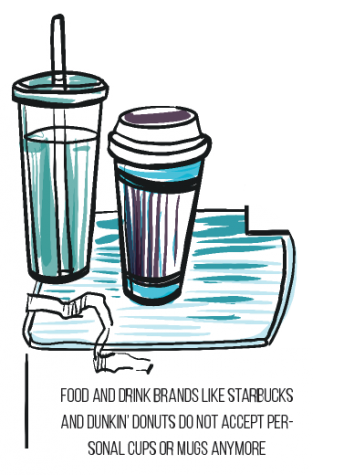
Supermarkets and convenience stores have transitioned to single-use packaging and bags in order to decrease the risk of spreading COVID-19. Large corporations like Target and Whole Foods no longer allow customers to bring their own reusable bags, and food and drink brands like Starbucks and Dunkin’ Donuts do not accept personal cups or mugs anymore.
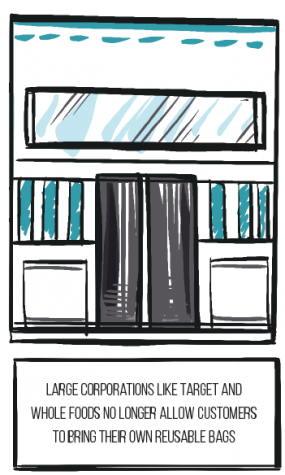
“COVID-19 made a huge impact [on the environment]. A lot of stores and farmers’ markets have forbidden the use of reusable bags for loading up your produce, so they have forced the emergence of single use plastic bags,” said upper school biology teacher Kate Schafer.
Additionally, the Center for Disease Prevention and Control (CDC) advises that restaurants planning to reopen should consider switching to plastic utensils and plates and individually-packaged condiments.
Since the start of the pandemic, multiple states and cities have delayed or paused their restrictions on single-use plastics. San Francisco, which banned disposable plastic bags in 2007, temporarily lifted the ban to protect customers and retailers. Other states have taken similar action, with Maine and New York postponing their bans on single-use plastics and Oregon and Massachusetts removing restrictions.
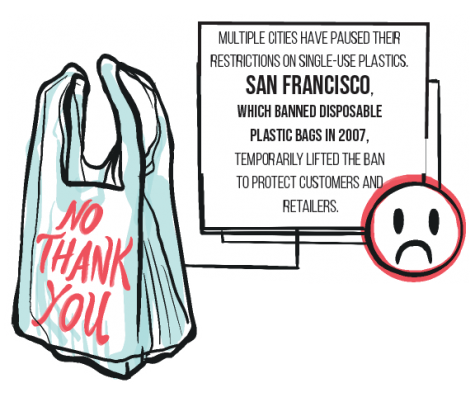
A study published in August for the Elsevier Public Health Emergency Collection predicts that the plastic demand for packaging will increase by 40% and plastic demand in other areas will increase by 17% due to the pandemic.
Furthermore, the loss of waste management companies means that recycled plastic cannot be treated correctly. US cities have restricted recycling streams, so single-use plastics are mixed with solid waste.
Our planet and our ecosystem are extremely sensitive to plastic, and this new surge may be difficult to recover from.
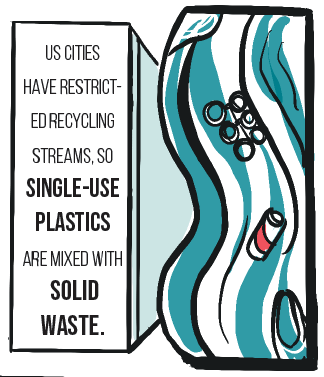
“Big chunks of plastic are obviously terrible, and there’s been a ton of research done on how plastic impacts seabirds and how when microplastics get into the tissues of organisms, they don’t function the way that they should,” said Dr. Schafer. “There have been many papers on the effects, especially on aquatic ecosystems. And many species, especially seabirds, mistake plastic for food and then it gets stuck in their stomachs and they starve.”
Although climate change activist Radha Mehta (10) agrees that plastic is more “necessary in these times,” she believes that there are still ways to protect our environment.
“There are simple things everyone can do. Every time you see some kind of plastic packaging, just find out if there’s an alternative where you don’t need plastic. There are a lot of zero waste stores online that you can look at, too,” said Radha.
Drop in emissions has occurred due to less travel during the pandemic
The transportation sector is in decline in 2020 due to reduced travel during the COVID-19 pandemic. Air travel is projected to drop by 66% in 2020 when compared to last year’s numbers, according to the International Air Transport Association (IATA), a trade association representing airlines from 120 countries, and in addition, surface transportation, modes of transport excluding airplanes, has decreased by more than 50% in over 50% of the world’s population.
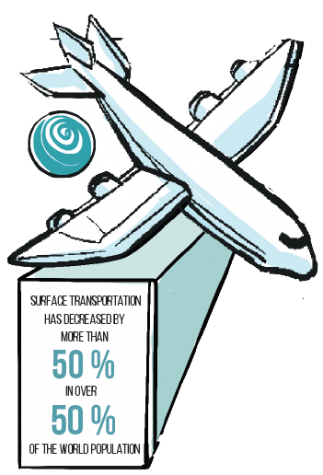
According to the Rhodium Group, an economic data research provider, the United States experienced minimal change in greenhouse gas emissions in the transportation sector in 2019, decreasing by 0.3% after a few years of growth. However, a study published in August for Nature Climate Change indicated that in 2020, country-level transportation emissions are within a 20% decline.
“Overall, the pandemic has decreased fossil fuel consumption by a lot,” Jeff Sutton, upper school AP Environmental Science teacher, said. “If we can pivot into using less fossil fuels and jump right into solar and wind and renewable energies, we can continue to see a decrease in greenhouse gases that are being released through transportation.”
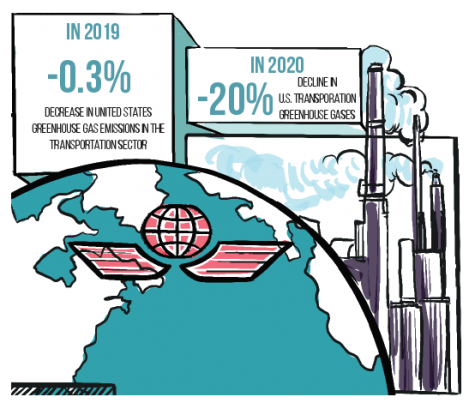
Transportation in the Bay Area is taking a toll due to the pandemic, as fewer riders have led to reduced operating hours and fewer buses and trains. Bay Area Rapid Transit (BART) has experienced an 84.7% drop in ridership from Sept. 1 to Oct. 15, compared to baseline values from last year. In addition, Valley Transportation Authority (VTA) buses are running on reduced service until further notice as ridership has decreased by a similar amount during the pandemic.
“As far as public or community transportation, it’s disappeared [during the pandemic], and I think that when things start to get back to normal, it won’t really change,” Arthur Jakobsson (12), who took the bus to school before the pandemic, said. “There might be a negative effect of people taking less public transportation because they don’t want to get infected.”
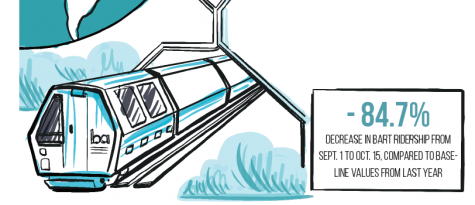
Intercampus shuttles that ran during the school year before school and in the afternoon have been halted, and bus service to Silver Creek, Fremont and Peninsula has also been paused as school continues in remote learning.